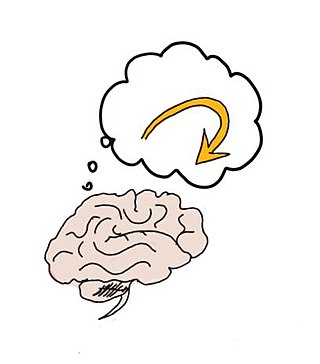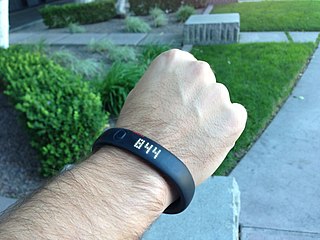Related Research Articles
Critical thinking is the process of analyzing available facts, evidence, observations, and arguments to make sound conclusions or informed choices. It involves recognizing underlying assumptions, providing justifications for ideas and actions, evaluating these justifications through comparisons with varying perspectives, and assessing their rationality and potential consequences. The goal of critical thinking is to form a judgment through the application of rational, skeptical, and unbiased analyses and evaluation. In modern times, the use of the phrase critical thinking can be traced to John Dewey, who used the phrase reflective thinking, which depends on the knowledge base of an individual; the excellence of critical thinking in which an individual can engage varies according to it. According to philosopher Richard W. Paul, critical thinking and analysis are competencies that can be learned or trained. The application of critical thinking includes self-directed, self-disciplined, self-monitored, and self-corrective habits of the mind, as critical thinking is not a natural process; it must be induced, and ownership of the process must be taken for successful questioning and reasoning. Critical thinking presupposes a rigorous commitment to overcome egocentrism and sociocentrism, that leads to a mindful command of effective communication and problem solving.
Transformative learning, as a theory, says that the process of "perspective transformation" has three dimensions: psychological, convictional, and behavioral.
Transformative learning is the expansion of consciousness through the transformation of basic worldview and specific capacities of the self; transformative learning is facilitated through consciously directed processes such as appreciatively accessing and receiving the symbolic contents of the unconscious and critically analyzing underlying premises.

An athletic coach is a person coaching in sport, involved in the direction, instruction, and training of a sports team or athlete.

Metacognition is an awareness of one's thought processes and an understanding of the patterns behind them. The term comes from the root word meta, meaning "beyond", or "on top of". Metacognition can take many forms, such as reflecting on one's ways of thinking, and knowing when and how oneself and others use particular strategies for problem-solving. There are generally two components of metacognition: (1) cognitive conceptions and (2) cognitive regulation system. Research has shown that both components of metacognition play key roles in metaconceptual knowledge and learning. Metamemory, defined as knowing about memory and mnemonic strategies, is an important aspect of metacognition.
Nursing theory is defined as "a creative and conscientious structuring of ideas that project a tentative, purposeful, and systematic view of phenomena". Through systematic inquiry, whether in nursing research or practice, nurses are able to develop knowledge relevant to improving the care of patients. Theory refers to "a coherent group of general propositions used as principles of explanation".
Psychiatric nursing or mental health nursing is the appointed position of a nurse that specialises in mental health, and cares for people of all ages experiencing mental illnesses or distress. These include: neurodevelopmental disorders, schizophrenia, schizoaffective disorder, mood disorders, addiction, anxiety disorders, personality disorders, eating disorders, suicidal thoughts, psychosis, paranoia, and self-harm.
Reflective practice is the ability to reflect on one's actions so as to take a critical stance or attitude towards one's own practice and that of one's peers, engaging in a process of continuous adaptation and learning. According to one definition it involves "paying critical attention to the practical values and theories which inform everyday actions, by examining practice reflectively and reflexively. This leads to developmental insight". A key rationale for reflective practice is that experience alone does not necessarily lead to learning; deliberate reflection on experience is essential.

Self-care has been defined as the process of establishing behaviors to ensure holistic well-being of oneself, to promote health, and actively manage illness when it occurs. Individuals engage in some form of self-care daily with food choices, exercise, sleep, and hygiene. Self-care is not only a solo activity, as the community—a group that supports the person performing self-care—overall plays a role in access to, implementation of, and success of self-care activities.

Alison Kitson FRCN is inaugural Vice President and Executive Dean of the College of Nursing and Health Sciences at Flinders University South Australia. She is also an Associate Fellow of Green Templeton College, Oxford, United Kingdom.
The Nursing Outcomes Classification (NOC) is a classification system which describes patient outcomes sensitive to nursing intervention. The NOC is a system to evaluate the effects of nursing care as a part of the nursing process. The NOC contains 330 outcomes, and each with a label, a definition, and a set of indicators and measures to determine achievement of the nursing outcome and are included The terminology is an American Nurses' Association-recognized terminology, is included in the UMLS, and is HL7 registered.

Reflective writing is an analytical practice in which the writer describes a real or imaginary scene, event, interaction, passing thought, or memory and adds a personal reflection on its meaning. Many reflective writers keep in mind questions such as "What did I notice?", "How has this changed me?" or "What might I have done differently?" when reflecting.
Workplace safety in healthcare settings is similar to the workplace safety concerns in most occupations, but there are some unique risk factors, such as chemical exposures, and the distribution of injuries is somewhat different from the average of all occupations. Injuries to workers in healthcare settings usually involve overexertion or falling, such as strained muscles from lifting a patient or slipping on a wet floor. There is a higher than average risk of violence from other people, and a lower than average risk of transportation-related injuries.

Quantified self is both the cultural phenomenon of self-tracking with technology and a community of users and makers of self-tracking tools who share an interest in "self-knowledge through numbers". Quantified self practices overlap with the practice of lifelogging and other trends that incorporate technology and data acquisition into daily life, often with the goal of improving physical, mental, and emotional performance. The widespread adoption in recent years of wearable fitness and sleep trackers such as the Fitbit or the Apple Watch, combined with the increased presence of Internet of things in healthcare and in exercise equipment, have made self-tracking accessible to a large segment of the population.
Science of morality may refer to various forms of ethical naturalism grounding morality and ethics in rational, empirical consideration of the natural world. It is sometimes framed as using the scientific approach to determine what is right and wrong, in contrast to the widespread belief that "science has nothing to say on the subject of human values".

Holistic nursing is a way of treating and taking care of the patient as a whole body, which involves physical, social, environmental, psychological, cultural and religious factors. There are many theories that support the importance of nurses approaching the patient holistically and education on this is there to support the goal of holistic nursing. The important skill to be used in holistic nursing would be communicating skills with patients and other practitioners. This emphasizes that patients being treated would be treated not only in their body but also their mind and spirit.. Holistic nursing is a nursing speciality concerning the integration of one's mind, body, and spirit with his or her environment. This speciality has a theoretical basis in a few grand nursing theories, most notably the science of unitary human beings, as published by Martha E. Rogers in An Introduction to the Theoretical Basis of Nursing, and the mid-range theory Empowered Holistic Nursing Education, as published by Dr. Katie Love. Holistic nursing has gained recognition by the American Nurses Association (ANA) as a nursing specialty with a defined scope of practice and standards. Holistic nursing focuses on the mind, body, and spirit working together as a whole and how spiritual awareness in nursing can help heal illness. Holistic medicine focuses on maintaining optimum well-being and preventing rather than just treating disease.
Kolcaba's theory of comfort explains comfort as a fundamental need of all human beings for relief, ease, or transcendence arising from health care situations that are stressful. Comfort can enhance health-seeking behaviors for patients, family members, and nurses. The major concept within Katharine Kolcaba's theory is the comfort. The other related concepts include caring, comfort measures, holistic care, health seeking behaviors, institutional integrity, and intervening variables.

Oral care swabs are disposable, single-use oral care sponges attached to a stick. They are used for oral care in the hospital and long-term care setting. Disposable oral care swabs may also be known by other various names, such as sponge swab, swabs for oral care, foam swab, mouth swab, oral swabstick, and the trademark name Toothette.
Systemic intervention is a deliberate operation by intervening agents that seeks people to make alterations in their lives in psychology. This analyses how people deal with challenges in the contemporary era, including their power relations and how they reform relationship with others. Midgley ventured new approach to systems philosophy and social theory that could develop variety usage of the multiple strands of systemic thinking to systemic intervention. Scientific methods could be used as a segment of the intervention practice. However, it does not deal with all of the problems of systemic thinking as well as the science complexity.
Debra Elizabeth Jackson is an Australian academic nurse and professor of nursing at the Susan Wakil School of Nursing at the University of Sydney, Australia. In 2021 she was awarded professor emerita in the faculty of health in the University of Technology Sydney. She holds a number of adjunct roles including honorary professor of nursing, Oxford Health NHS Foundation Trust, visiting professor at the Florence Nightingale Faculty of Nursing and Midwifery in King's College London, Bournemouth University, and Auckland University of Technology. She was previously the editor-in-chief of the Journal of Clinical Nursing and is now the editor-in-chief of the Journal of Advanced Nursing.

Daniel J. Pesut is an American nurse educator, academic, researcher, and coach. He is an Emeritus Professor of Nursing, Past Director of Katharine J. Densford International Center for Nursing Leadership, and Katherine R. and C. Walton Lillehei Chair in Nursing Leadership at University of Minnesota.
References
- ↑ Carper Barbara A (1978). "Fundamental Patterns of Knowing in Nursing". Advances in Nursing Science. 1 (1): 13–24. doi:10.1097/00012272-197810000-00004. PMID 110216. S2CID 36893665.
- ↑ Melanie Jasper (2003), Beginning reflective practice. Nelson Thornes, ISBN 0-7487-7117-4; pp. 93–95
- ↑ Aesthetic, Online Etymology Dictionary
- ↑ Johns, C (1995). "Framing learning through reflection within Carper's fundamental ways of knowing in nursing". Journal of Advanced Nursing. 22 (2): 226–34. doi:10.1046/j.1365-2648.1995.22020226.x. PMID 7593941.
- ↑ Heath Helen (1998). "Reflection and patterns of knowing in nursing" (PDF). Journal of Advanced Nursing. 27 (5): 1054–1089. doi:10.1046/j.1365-2648.1998.00593.x. PMID 9637334.
- ↑ McKenna H, Cutliffe J, McKenna P (1999). "Evidence-based practice: demolishing some myths" (PDF). Nursing Standard. 14 (16): 39–42. doi:10.7748/ns2000.01.14.16.39.c2738. PMID 11209438.
{{cite journal}}: CS1 maint: multiple names: authors list (link)